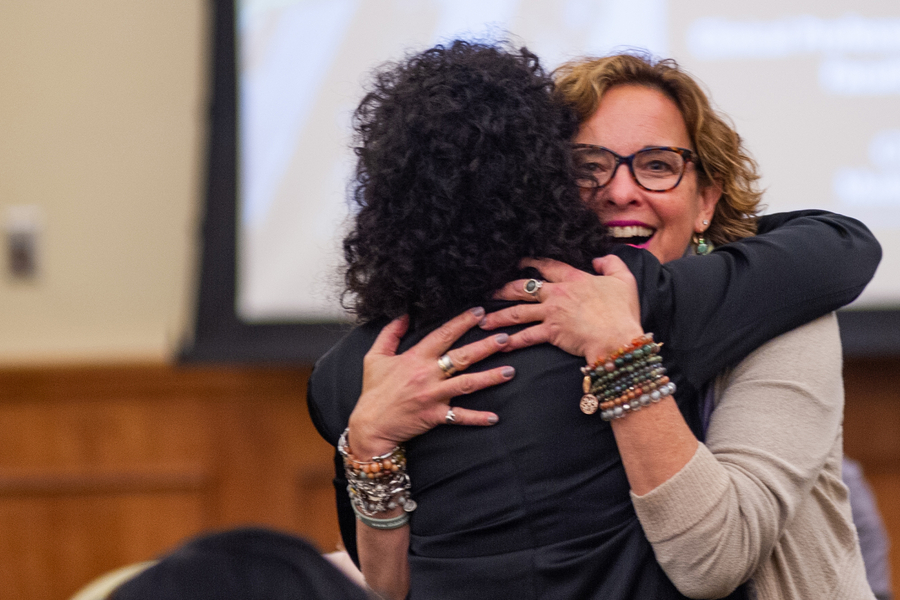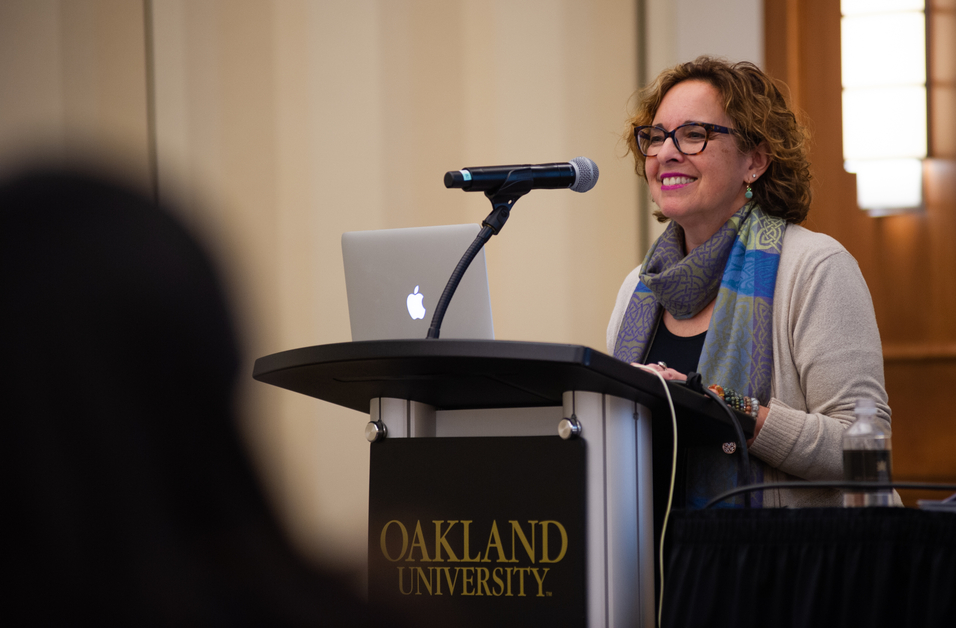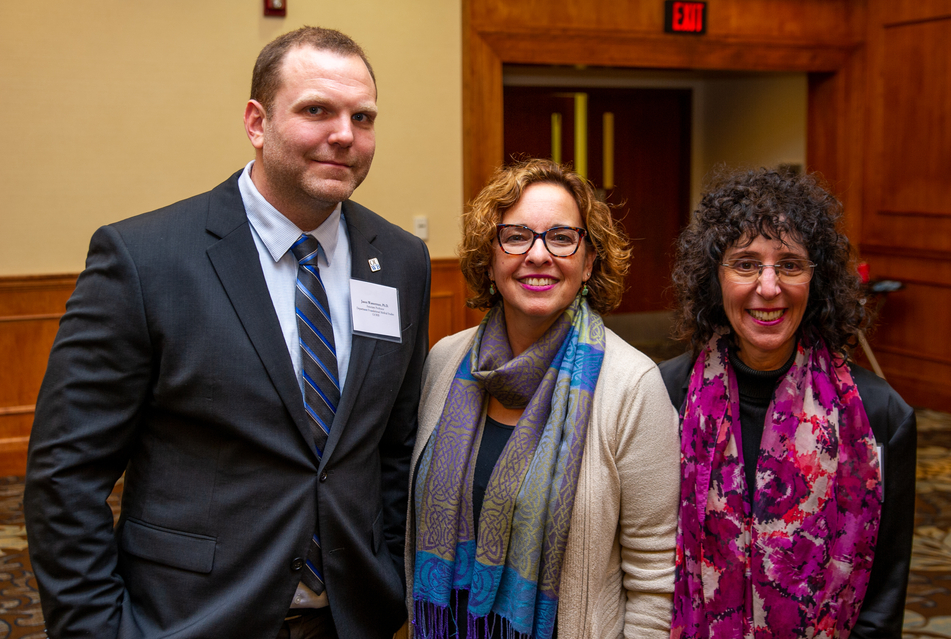
For all the roles and responsibilities in her life — along with the ups, downs, and everything between — two things are certain about Hedy Wald, Ph.D.: she’s always busy and loves to smile.
The busyness stems from a lifetime spent in and around medicine that includes her current work: clinical professor of Family Medicine at the Warren Alpert Medical School of Brown University; faculty at the Harvard Medical School Pediatrics Leadership Program; guest lecturer; workshop leader, and more.
She also serves as a member of the Lancet Commission on Medicine and the Holocaust — and is co-director of OUWB’s Holocaust and Medicine program. The program includes a study trip to Auschwitz, a first-of-its-kind for a U.S.-based medical school.
Though often related to the work that keeps her going — she jokes that she doesn’t know the meaning of “down time” — the smiles essentially come from another place, a relatively uncomplicated personal goal.
“I do make a conscious effort to find joy in every simple pleasure of life every day because I’ve had tragedy,” she says. “My parents really taught me a lot about just enjoying really simple pleasures of life and immersing in them. That’s been a mantra of mine.”
‘A wonderful childhood’
 |
| Wald says she makes a "conscious effort to find joy in every simple pleasure of life every day." |
Hedy Wald is one of four children born to Ruth and Morris Wald. She is the oldest.
The fact that the family even exists is a miracle, she says, especially considering her father’s entire family was murdered at concentration camps Auschwitz and Treblinka.
“(My father) almost died numerous times, but somehow survived,” says Wald.
Post-war, her father spent time recovering from illness in Italy and Sweden before moving to the United States. As Wald puts it, her father “miraculously” met her mother and the two started out in a one-bedroom apartment in Brooklyn, New York.
The family eventually settled into a house in Deer Park, a hamlet of New York’s Long Island.
“I had a wonderful childhood there and grew up with a strong Jewish identity,” she says.
Wald says she also took note of how “euphoric” her parents would become when they did the things that brought them happiness: gardening and bicycling, for example.
Wald says she approached the things she was passionate about with the same vigor — primarily scholarly activities, including creative writing. (Though she also loves a good bike ride.)
That included her involvement in the Hadassah Young Judaea program — an experience that foreshadowed what her career would eventually look like.
“My teaching life and leadership life came out at a very young age,” she says. “I was president in eighth grade, developed teaching tips on various Jewish and Israel identity topics during high school, and taught different learners at different youth conventions.”
In 1979, Wald earned an undergraduate degree in psychology from Clark University. She would go on to earn a master’s degree and Ph.D., from Yeshiva University and Yeshiva’s Ferkauf Graduate School Albert Einstein College of Medicine.
She met her husband, Mark, and together, they built a life that included four children. (Today, she has five grandchildren.)
Hedy worked as a psychologist and taught at Brown as Mark toiled away as a neurologist.
Things were good until May 4, 2012.
‘Extra motivation’
Mark Weiner self-diagnosed a glioblastoma at 57 years of age. Hedy Wald would leave her practice to take care of him.
In a piece for JAMA Neurology called “Helping My Husband Live and Die,” Hedy Wald called it an aggressive brain cancer, a “death sentence.” She wrote about taking care of her husband and coming to terms with his death — and how he continued to support her personal and professional growth.
“Through these trying years, with a full heart and heartbreak, I’ve helped my husband navigate an unanticipated life of disability and capture some quality of life within Herculean efforts to maximize quality of life,” she wrote.
“And with his unwavering support, I’ve continued to teach and even travel to present on promoting resilience, now more relevant than I could have every imagined. I’ve helped him live, he’s helped me live, and now I am helping him die.”
Six-and-a-half years after diagnosis, in 2018, Mark died. Hedy Wald says the experience of watching her husband die 10 years after her father passed gave her a “certain sensitivity” and a first-hand look and appreciation for the value of humanism and empathy in medicine.
“The work I do now in teaching the legacy of medicine during the Holocaust is dedicated in memory of my father and his supportive wife, my mother…and my husband,” she says. “It gives me extra motivation.”
‘So enamored’
 |
| From left, Jason Wasserman, Ph.D. — co-director of OUWB's Holocaust and Medicine program — Wald, and Oakland University President Ora Hirsch Pescovitz, M.D. |
While still working as a clinical psychologist before her husband’s diagnosis, Wald was invited in 2005 to teach at Warren Alpert Medical School of Brown University.
It worked for her in several ways.
“When my husband became critically ill, I did not return to clinical work,” she says. “I stayed in academic work because I could be more flexible with my schedule. But I also found people really liked my work.”
Wald says she enjoyed teaching interactive reflective writing to support morally resilient professional identity formation, enhance critical reflective skills, and get more involved in the work of resilience and well-being in medical students, residents, and faculty.
“I became so enamored I started doing research on how to teach faculty using systemized frameworks for providing formative feedback to students’ reflective writings,” she says.
Wald says previously there was a gap in literature on the topic so she started working with her colleagues to publish extensively on the subject.
“That (work) morphed into not just teaching at Brown, but developing workshops, training, keynotes, and lectures,” she said.
Wald has been honored with Dean’s Excellence in Teaching Awards, served as a Fulbright Scholar in medical education for the Ben Gurion University of Health Sciences Faculty of Medicine in Israel, and is a Gold Humanism Foundation Harvard-Macy Scholar.
She presents invited keynotes, plenaries, and experiential workshops for faculty retreats, trainee sessions, and international conferences on promoting resilience, well-being, and vitality in health professions education and practice, a research interest.
Further, she presents internationally on reflective writing-enhanced reflection to support professional identity formation in health professions education and has published widely on the topic, including guest editing a collection of articles for an Academic Medicine theme issue on professional identity formation.
Also, she recently authored a paper with Julie Kruse, Ph.D., associate professor, OU School of Nursing. The paper is called "Legacy of the Role of Medicine and Nursing in the Holocaust: An Educational Intervention to Support Nursing Student Professional Identify Formation and Ethical Conduct." It was published in Nursing Education Perspectives, the research journal for the National League of Nursing.
Wald says she feels most satisfied with her work when she reaches people in a way that helps them with their identity formation. She says she feels most proud when she sees the work she’s been involved with having an impact.
“It’s about people saying you made a difference…you made a difference for us as educators and us as students,” she says.
Having a dream
When Wald came to OUWB in early 2020 — just before COVID-19 changed everything for everyone — she was the keynote speaker for the Faircloth Evening of Medical Humanism. She was invited by Jason Wasserman, Ph.D., associate professor in OUWB’s Department of Foundational Medical Studies, course director for the Medical Humanities and Clinical Bioethics curriculum, and director of Student Professionalism. He also conducts ethics consultation for area hospitals.
Wasserman is the other co-director of OUWB’s Holocaust and Medicine program.
| More from OUWB |
Destination Poland: Students to study abroad via OUWB Holocaust and Medicine program |
Wald’s keynote was called “Holocaust & Medicine Education for Humanistic Professional Resilient Formation: A Holocaust Survivor’s Daughter Teaches German Medical Students at Auschwitz – My Story.”
That event also included a side conversation that served as the catalyst for making OUWB”s Holocaust and Medicine program a reality.
To Oakland University President Ora Hirsch Pescovitz, M.D., Wald recounted what happened to her when she gave a presentation called “Got Resilience? An Integrated Approach” at the Association of Medical Education in Europe annual conference in Switzerland.
According to Wald, a professor from Witten/Herdecke University in Germany approached her. The professor wanted Wald to go with a team of German medical students to Auschwitz and lead them in reflective writing workshops.
“I told (Pescovitz) I have a dream to take U.S. medical students to Auschwitz,” she says.
According to Wald, Pescovitz’s response was, “Let’s do it!”
Since then, logistics of the trip and the curriculum have been worked out.
The curriculum includes pre- and post-trip educational sessions, as well as intensive focus on student reflection about ethics, humanism, and professional identity formation. Participants will engage in a seven-week seminar when they return and share what they learn throughout the community.
The fact that students had to submit essays about why they wanted to go on the trip says a lot to Wald about what to expect.
“The students want to come on this trip and I think that’s special and that should be celebrated,” she says. “I think I’m going to grow as a human being because I’m going to work with students like that.”
For more information, contact Andrew Dietderich, marketing writer, OUWB, at [email protected].
To request an interview, visit the OUWB Communications & Marketing webpage.
NOTICE: Except where otherwise noted, all articles are published under a Creative Commons Attribution 3.0 license. You are free to copy, distribute, adapt, transmit, or make commercial use of this work as long as you attribute Oakland University William Beaumont School of Medicine as the original creator and include a link to this article.

